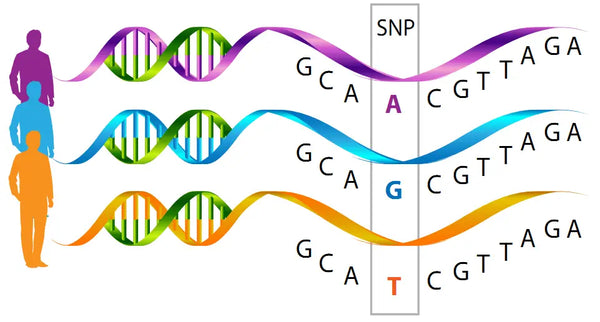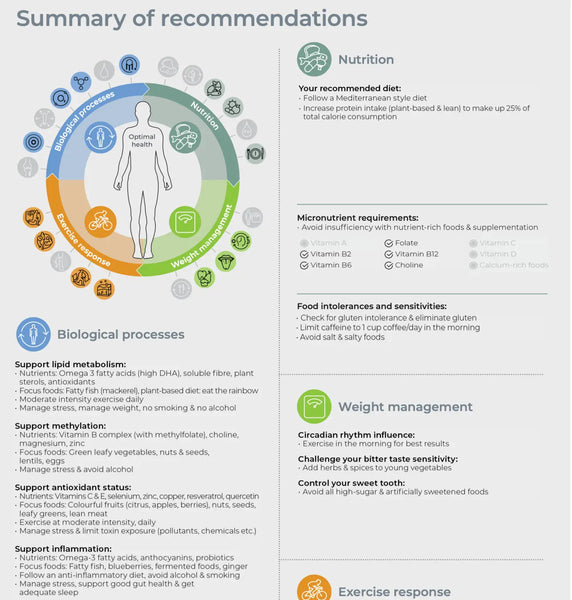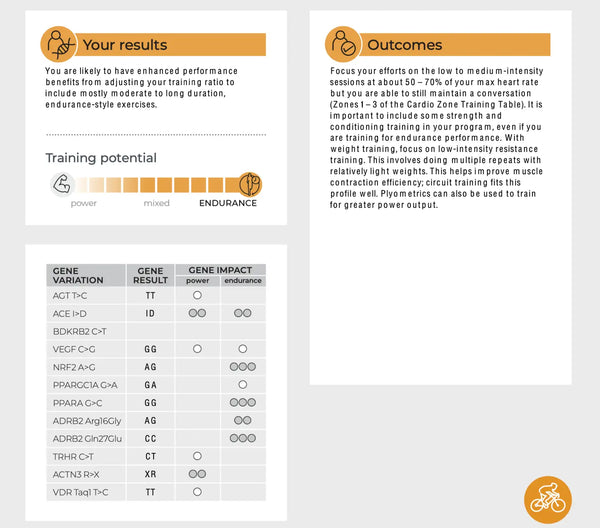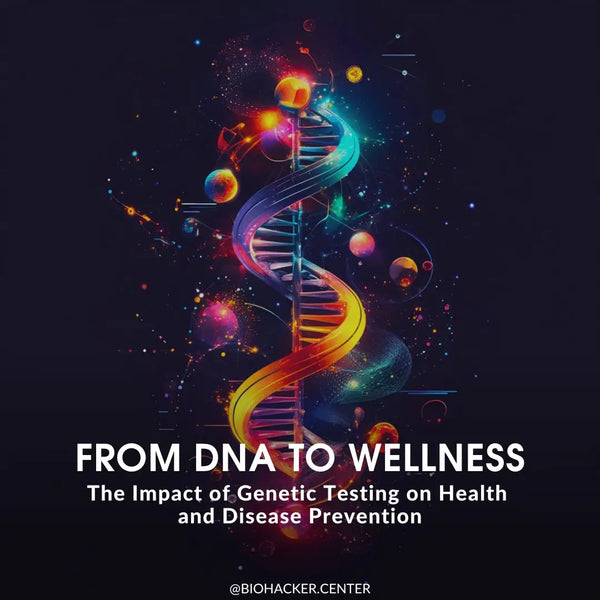DNA and genetic testing have been available for biohackers and consumers for the past 10+ years. Do you remember 23andMe? Since then, things have developed quickly, and now, the data and analytics provided by test companies have taken giant leaps. DNA tests have become crucial in personalized and preventive medicine and are a growing point for healthspan optimization. This article takes a closer look into the science of DNA and genetic testing and introduces companies at the forefront of this evolution.
Understanding DNA and Genetic Testing
Deoxyribonucleic acid (DNA) is a double-stranded helical molecule that constitutes the fundamental genetic material in all known living organisms and many viruses. It encodes the genetic instructions required for organisms' growth, development, functioning hich shouldand reproduction at the molecular level.(1)
DNA is composed of two long polymers of nucleotides, with backbones made of sugars and phosphate groups joined by ester bonds. The nucleotide sequences are made up of four nitrogenous bases: adenine (A), thymine (T), cytosine (C), and guanine (G). They have a specific pairing sequence (A with T and C with G) to facilitate DNA replication and transcription processes.(2)
Genetic testing implicates systematically analyzing DNA sequences to detect genetic variations. These include single nucleotide polymorphisms (SNPs), insertions, deletions, copy number variations (CNVs), or chromosomal rearrangements. They can alter gene function or regulation, potentially contributing to phenotypic differences (organisms' observable traits, such as humans). These may eventually lead to predispositions to specific health conditions, metabolic capacities, and responses to environmental factors or medications.(3-4)

Image: An example of SNP.
Source: Nutrigeneticsspecialists.com (2023).
High-throughput sequencing methods like next-generation sequencing (NGS) have revolutionized the field of genetics by enabling rapid, accurate, and cost-effective decoding of an individual's genetic information.(5) Whole-exome sequencing (WES) and targeted gene panels allow for comprehensive or specific examination of genetic material. Bioinformatics tools and computational algorithms interpret the vast data and identify clinically significant genetic variants.(6-7)
Genetic testing can reveal for example, the following:
- Predispositions to Diseases
- Identification of pathogenic variants in genes associated with monogenic disorders (e.g., BRCA1/BRCA2 mutations linked to breast and ovarian cancer) or susceptibility loci contributing to multifactorial diseases (e.g., variants in the APOE gene influencing Alzheimer's disease risk).(8-9)
- Nutritional Needs
- Analysis of genes involved in nutrient metabolism (e.g., MTHFR gene variants affecting folate metabolism) enables personalized nutritional recommendations (also known as nutrigenomics).(10)
- Medication Responses
- Pharmacogenomic profiling assesses genetic factors that affect drug metabolism enzymes (e.g., CYP450 family), transporters, and receptors, guiding dosage adjustments and medication selection to enhance efficacy and reduce adverse effects.(11)
When genetic data is integrated with clinical and environmental information, it facilitates a precision medicine approach that tailors prevention and treatment strategies to individual genetic profiles. Ethical considerations, including informed consent, privacy, and data security, are essential in applying genetic testing.
Benefits of Genetic Testing for Health and Prevention
Personalized Health Insights
Genetic testing offers individualized information regarding an individual's predisposition to various health conditions by identifying specific genetic variants associated with disease risk, such as a risk for an altered metabolic condition or a predisposition for injury.
A comprehensive analysis of an individual's genomic sequence can detect mutations or polymorphisms that may contribute to the development of monogenic or complex multifactorial diseases. For instance, identifying mutations in the LDLR (LDL receptor) gene can indicate a heightened risk for familial hypercholesterolemia, allowing for early interventions.(12)

For example, for Dr. Sovijärvi, here is what the genetic data suggests lifestyle-wise (nutrigenomics and more):
Personal Dietary Guidelines:
- Mediterranean-style diet with increased lean protein intake (25% of total calories) (FTOT>A)
- Adequate intake of essential micronutrients, particularly vitamins B2, B6, B12 (FUT2 Gly258Ser G>A), Folate (see MTHFR below), Choline
- Eliminate gluten (HLA DQ2 / DQ8)
- Limit coffee to 1-2 cups per day (COMT 472 G>A, CYP1A2 A>C)
Biological Processes Management:
- Support lipid metabolism (APO E4/E3)
- Improve methylation (MTHFR 677 C>T, MTRR 66 A>G, COMT 472 G>A)
- Increase antioxidant status (MnSOD/ SOD2 47 T>C (Val16Ala)
- Lower inflammation (CRP GG, IL-1A 4845G>T & -889 C>T, IL-6 -174 G>C)
Exercise for Weight Management:
Aim for > 20 MET hours per week = for example: 9 MET hours (2x strength) + 8 MET hours (1.5h cardio) + 3 MET hours (yoga).
- ADRB2 Gln27Glu

Endurance and Performance Improvement:
Moderate to long-duration endurance exercises combined with low-intensity strength/resistance training.
- ADRB2 Arg16Gly A>G
- FTOT>A
- NRF2 A>G (associated with endurance profile)
Recovery and Injury Prevention:
Adequate rest, good sleep hygiene, flexibility training, and supporting joint health (collagen peptides, hyaluronic acid, etc.).
- Collagen & injury risk (COL1A1 1546 G>T, GDF5 C>T, COL5A1 C>T)
- Recovery & inflammation (IL-6 -174 G>C, CRP G>A, MnSOD/SOD2 47 T>C (Val16Ala))
Informed Lifestyle Choices
Understanding the genetic influences on metabolism, nutrient absorption, and physiological responses helps individuals make informed nutritional and physical activity decisions.
Genetic variations can affect how the body processes and absorbs carbohydrates, lipids, proteins, vitamins and minerals. For example, polymorphisms in the MTHFR gene can impair folate metabolism, which should lead to dietary adjustments or supplementation (see Dr. Sovijärvi's example before). Variants in the CYP1A2 gene influence caffeine metabolism, affecting individual tolerance levels (same thing here).(13)
By using genetic information in personalized nutrition plans with nutrigenomics, individuals can optimize their dietary intake to align with their metabolic capacities, enhance nutrient utilization and prevent nutrition-related disorders. These include both macro- and micronutrient quantities and qualities. For some people, a ketogenic, low-carb approach works the best; for others, a relatively high-carb diet is optimal. Some people need more protein (like Dr. Sovijärvi, based on his genetic data), and others need less.
Genetic factors such as ACTN3 gene variants can influence muscle fiber composition and athletic performance potential in physical fitness.(14) Tailoring exercise regimens based on genetic predispositions to physical ailments and recovery risk can improve efficacy, reduce injury risk, and improve overall health maintenance. Based on individual cardiorespiratory and muscle genetics, it is possible to create more individualized exercise and recovery plans.
Introducing SelfDecode DNA Testing
SelfDecode is a leading provider of DNA testing services focused on health and wellness. It utilizes cutting-edge genomic technologies and AI-driven analysis and is thus able to provide comprehensive and tailorable reports that translate complex genetic data into actionable insights.
Key Features of SelfDecode
- Comprehensive Genetic Reports
- Detailed analyses covering various health aspects, including disease risk, nutrition, and mental health.
- Personalized Recommendations
- Evidence-based suggestions tailored to individual genetic profiles.
- Secure Data Handling
- Robust privacy measures ensure that genetic data is protected and confidential
- User-Friendly Platform
- An intuitive interface that makes complex genetic information accessible to non-experts.
Selfdecode analytic details:
750,000 SNPs with genetic imputation reaching data of over 200 million additional variants with an accuracy of 99.7%. 300x more analysis of the genome than any other company on the market. For example, blood pressure looks at 1 million genetic variants, while 23andme only looks at 3000. Selfdecode gives 650+ health & trait reports, a lab test analyzer, an intelligent recommendations engine, a personalized meal planner and more.
The Customer Experience with SelfDecode
Purchasing a DNA test kit from SelfDecode is a straightforward process. Here are the basic steps when you buy a test kit:
- Customers can easily order the SelfDecode DNA Test Kit online.
- The kit includes simple instructions for collecting a saliva sample at home.
- The sample is returned to the laboratory using a prepaid envelope.
- Advanced algorithms analyze the DNA to generate personalized reports.
- Customers receive access to their reports through a secure online portal.
- SelfDecode provides continuous updates and new insights as genetic research evolves.
Conclusion
First, DNA and genetic testing transformed the way functional medicine doctors work. These previously complex and hard-to-understand tests are readily available for anyone interested in reaching the next level of health optimization and disease prevention.
It's not just about preventing diseases; it is also very much about understanding your unique biology and finding what suits your body well, whether through diet, recovery, supplements, exercise, or other lifestyle modifications.
The platforms interpreting individual DNA results have become very intuitive and provide ever more beneficial and actionable suggestions based on data.
Take control of your health journey today with SelfDecode DNA Testing. Discover the personalized insights that can lead to a healthier and longer life.
Scientific References:
- Miles, J. S., & Wolf, C. R. (1989). Principles of DNA cloning. BMJ: British Medical Journal, 299(6706), 1019.
- Minchin, S., & Lodge, J. (2019). Understanding biochemistry: structure and function of nucleic acids. Essays in biochemistry, 63(4), 433-456.
- Frazer, K. A., Murray, S. S., Schork, N. J., & Topol, E. J. (2009). Human genetic variation and its contribution to complex traits. Nature Reviews Genetics, 10(4), 241-251.
- Zhang, F., Gu, W., Hurles, M. E., & Lupski, J. R. (2009). Copy number variation in human health, disease, and evolution. Annual review of genomics and human genetics, 10(1), 451-481.
- Slatko, B. E., Gardner, A. F., & Ausubel, F. M. (2018). Overview of next‐generation sequencing technologies. Current protocols in molecular biology, 122(1), e59.
- LaDuca, H., Farwell, K. D., Vuong, H., Lu, H. M., Mu, W., Shahmirzadi, L., ... & Chao, E. C. (2017). Exome sequencing covers> 98% of mutations identified on targeted next generation sequencing panels. Plos one, 12(2), e0170843.
- Miller, E. M., Patterson, N. E., Zechmeister, J. M., Bejerano-Sagie, M., Delio, M., Patel, K., ... & Montagna, C. (2017). Development and validation of a targeted next generation DNA sequencing panel outperforming whole exome sequencing for the identification of clinically relevant genetic variants. Oncotarget, 8(60), 102033.
- Schubert, S., van Luttikhuizen, J. L., Auber, B., Schmidt, G., Hofmann, W., Penkert, J., ... & Steinemann, D. (2019). The identification of pathogenic variants in BRCA1/2 negative, high risk, hereditary breast and/or ovarian cancer patients: High frequency of FANCM pathogenic variants. International journal of cancer, 144(11), 2683-2694.
- Lewis, C. M., & Vassos, E. (2020). Polygenic risk scores: from research tools to clinical instruments. Genome medicine, 12(1), 44.
- Kiani, A. K., Bonetti, G., Donato, K., Kaftalli, J., Herbst, K. L., Stuppia, L., ... & Bertelli, M. (2022). Polymorphisms, diet and nutrigenomics. Journal of preventive medicine and hygiene, 63(2 Suppl 3), E125.
- Lewis, J. R. (2024). Pharmacogenomics in Drug Metabolism Enzymes and Transporters. In Drug Discovery and Evaluation: Safety and Pharmacokinetic Assays (pp. 1929-1975). Cham: Springer International Publishing.
- Futema, M., Taylor-Beadling, A., Williams, M., & Humphries, S. E. (2021). Genetic testing for familial hypercholesterolemia—past, present, and future. Journal of lipid research, 62.
- Fulton, J. L., Dinas, P. C., Carrillo, A. E., Edsall, J. R., Ryan, E. J., & Ryan, E. J. (2018). Impact of genetic variability on physiological responses to caffeine in humans: A systematic review. Nutrients, 10(10), 1373.
- Baltazar-Martins, G., Gutiérrez-Hellín, J., Aguilar-Navarro, M., Ruiz-Moreno, C., Moreno-Pérez, V., López-Samanes, Á., ... & Del Coso, J. (2020). Effect of ACTN3 genotype on sports performance, exercise-induced muscle damage, and injury epidemiology. Sports, 8(7), 99.







